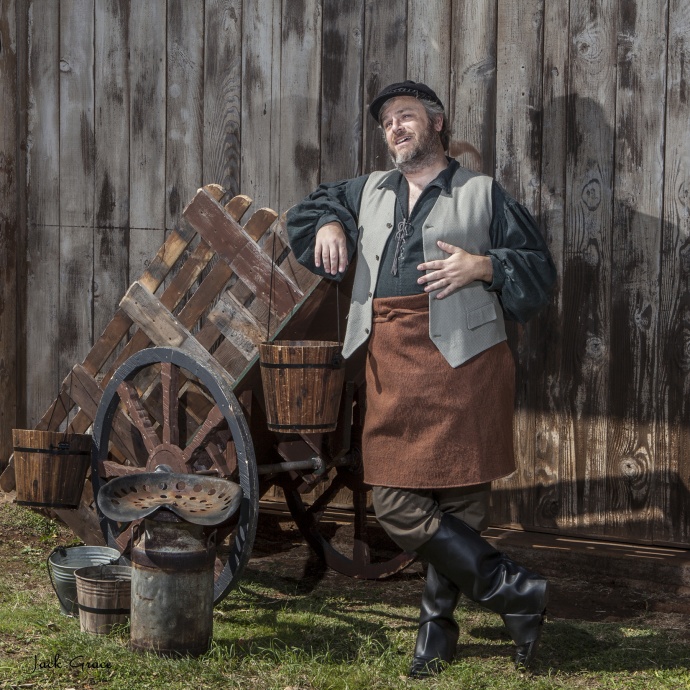Actor Shares Personal Tie to Maui ‘Fiddler on the Roof’ Role
By Vanessa Wolf
The Maui Academy of Performing Art’s spring season begins with an “intimate and re-imagined staging” of Fiddler on the Roof starting this Friday, Feb. 21.
Set in Tsarist Russia in 1905, the story centers on Tevye, the father of five daughters, and his attempts to maintain his family and Jewish religious traditions while outside influences encroach upon their lives.
Tevye must cope both with the strong-willed actions of his three older daughters — each one’s choice of husband moves further away from the customs of his faith — and with the edict of the Tsar that evicts the Jews from their village.
We spoke to actor Gary Shin-Leavitt, who plays Tevye, about the show.
Maui Now: How did you come to live on Maui?
Gary Shin-Leavitt: I moved to Maui in 2001. While working in the financial sector in New York City, I had the opportunity to take over the Maui branch office of a financial services company. Over time, I transitioned back into federal service (I am a Navy veteran), which I still do today and find extremely satisfying and rewarding.
MN: How did you get into musical theater?
GS-L: My parents were both very active in community musical theater productions when I was a child. One of my earliest memories, in fact, was sitting on the edge of the stage during rehearsals for a production of Fiddler on the Roof, in which my mother was playing Grandmother Tzeitel.
Music has always been a passion of mine. I attended the New England Conservatory of Music in Boston and have been very fortunate to perform on stages in several countries, including Carnegie Hall and Lincoln Center in in New York, mostly in a concert performance setting.
MN: What made you want to play Tevye?
GS-L: The opportunity to play Tevye in this production is so deeply personal for me, with connections both expected and unforeseen. The parallels between my family history and Tevye’s story are uncanny. My grandfather, Max, immigrated to the United States from a little “shtetl” or village called Wysokie Litewskie right about the same time as Fiddler takes place.
 We came from poor peasant stock, with cows just as Tevye has: my grandfather would relate how when the cows would come home from their daily graze, they would stop by the kitchen window to be fed some bread through the open window before walking back to their barn. They made their own cheese, cream, and butter, just as Tevye does.
We came from poor peasant stock, with cows just as Tevye has: my grandfather would relate how when the cows would come home from their daily graze, they would stop by the kitchen window to be fed some bread through the open window before walking back to their barn. They made their own cheese, cream, and butter, just as Tevye does.
When my grandfather was a young man, he had received word that a pogrom was planned for their village. He packed up, and moved to America with his wife Jennie.
He later brought my great-grandparents over to America as well. In the early 1930s word had started to trickle into the US that the Jews of Eastern Europe were again being aggressively persecuted. My great-grandmother chose to go back to try and help her family to escape. She was never heard from again, lost in the vast machinery that was the extermination camp system of the Third Reich.
Meanwhile,just as Tevye would have five daughters, my grandfather Max had five sons. I see elements of Tevye in both my grandfather and my father: both pragmatists, they were willing to try and change with the new times, even when it could be quite puzzling.
I remember my grandfather sneaking behind my grandmother when she would cook mashed potatoes, adding milk to them, even if it was a meat meal (very un-kosher, by the way). He would look at me with a sly wink and he would just touch the side of his nose, like it was our little secret.
My father, like Tevye, had a very strong faith. However, he chose to manifest that connection in a very personal way, not attending synagogue services except for the major holidays. My father’s external evidence of his faith was in his dealings with others – always kind and fair. He had a permanent twinkle in his eye, like he was in on a quiet, private joke. He was always smiling, even when our lives were challenging.
My personal history makes my personal connection to Tevye all the more real. It is my dearest hope that somehow I am able to convey a glimmer of my family… my father, my grandfather, and their journey- in Tevye’s journey.
MN: That touching story being the obvious answer, what’s one more reason Maui audiences simply cannot miss this show?
GS-L: Although this show highlights a very specific culture and time period, the themes and struggles that this family endures are universal: love, faith, changes in family values, forgiveness, hardship and endurance. I strongly believe that anyone who comes to see this show will be able to relate to these themes and find that they resonate deeply within their own lives.
I think that’s one of the reasons this show has been so popular for so long: we all deal with these struggles in very personal way, and I think everyone can take away something very meaningful and poignant.
—–
The MAPA version is directed by David C. Johnston and will run Feb. 21 through March 16 at the Steppingstone Playhouse in the Queen Kaahumanu Center.
Show times are 7:30 p.m. on Fridays and Saturdays and 2 p.m. on Sundays.
Tickets are $24 for adults, $22 for seniors, and $18 for students 18 and under.











